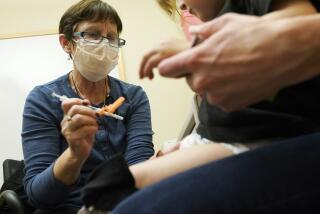Chickenpox Vaccine for Children Proposed
- Share via
Chickenpox may become an illness of the past if a proposed vaccine is approved by the Food and Drug Administration and adopted as part of routine childhood inoculations.
Chickenpox, known in medical circles as varicella, is a viral illness that generally lasts seven to 10 days. The illness commonly affects children under 10 years of age; its symptoms include a rash, fever and cough.
In healthy children, chickenpox is generally mild. But occasionally there are complications, such as bacterial infection of the skin, rash, pneumonia or encephalitis, an inflammation of the brain associated with the illness. There is no way to determine which healthy children will develop these serious complications.
Chickenpox can also be dangerous for children or adults with diseases that weaken the immune system, such as leukemia.
The American Academy of Pediatrics recommends the medication acyclovir for those with weakened immune systems but not for healthy children.
In order for acyclovir to change the course of chickenpox in healthy children, the medication must be started within 24 hours of the onset of the illness. And even after using acyclovir, the duration of the illness may not be reduced by more than one day.
Preventing chickenpox is the other alternative to treatment, and a vaccine against it has been studied in the United States for nearly 10 years.
But the chickenpox virus belongs to the herpes virus group and there have been concerns raised about potential side effects of the vaccine.
It was feared that the vaccine could cause periodic reactivation of the varicella zoster virus that causes chickenpox. When the varicella zoster virus reactivates, it causes a rash and pain in a local area and is known as shingles or zoster. But research indicates the vaccine causes less or no more shingles to occur than natural chickenpox.
The proposed chickenpox vaccine is made from a live, attenuated--or weakened--virus. The vaccine works by creating a mild infection similar to natural chickenpox without its related problems.
The mild infection spurs the body to react and develop immune responses. These defenses are then ready when the natural virus is encountered.
The chickenpox vaccine is expected to be recommended for children between 12 to 15 months of age. A booster shot, similar to that given for measles, may be advised for preschoolers. In older children or adults, two shots of the vaccine may be needed.
As with other vaccines, the inoculation may not be totally effective, with about 15% of those vaccinated perhaps still getting chickenpox, despite the vaccination. But after vaccination, the occurrence of chickenpox is expected to be mild, even in adults and children with weakened immune systems.
Trials also are under way to combine the chickenpox vaccine with that given for measles-mumps-rubella.






